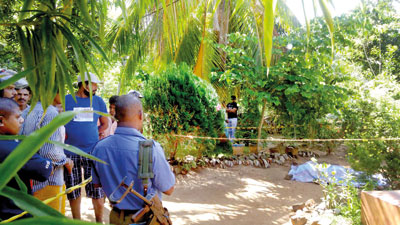News
Brutality worsens in continuing carnage
Egregiously violent murders have now become normal in Sri Lanka.
The police admit that brutality has risen a notch, although statistically, the number of murders has declined. There have been more than 200 murders in the first five months.
Between July 7 and 13, there were at least eight violent murders, including the murder of popular singer Priyani Jayasinghe. Her husband is the prime suspect.
A three-wheeler driver was stabbed to death by the paramour of his wife and a Colombo Municipal Council member was gunned down.

Scene of the crime: A man in Barawakumbuka, Ambalanthota was killed by his brother after a dispute. Pic by Rahul Samantha Hettiarachchi
Also a police sergeant who went to serve a warrant on a Buddhist monk, directing him to appear before the Ratnapura Magistrate’s court was strangled to death by the monk.
According to the police, the villagers called the emergency hotline after hearing screams for help. Police found the sergeant lying immobile on the temple grounds.
Then the monk had returned with a grenade to attack the police, but a police officer had knocked him down with a wooden plank. The suspect monk will be produced in court next week.
The Chief Judicial Medical Officer of Ratnapura Hospital, Dr A Dayapala, told the Sunday Times that he had submitted the autopsy report of the victim to court.
There were 452 murders in 2017, according to police data, down from 502 the year before.
In the first five months of this year, 214 murders have been reported. Suspects connected to 182 cases have been arrested and produced in court.
A senior official of the crime division of the Police Headquarters said that the face of crime has changed with time and crimes have become more violent as organized gangs use sophisticated weapons.
He noted that even the brutality of murders arising from disputes has increased. More murder victims bear multiple stab wounds or cuts.
“The police are doing their best, but sometimes fall behind with investigations since tracking down organised murders with changing tactics is becoming more and more difficult,” he said.
Inexperienced youth also think that violence is the best way to resolve issues, he said.
People have become more aggressive because of lifestyle changes.
A former senior deputy inspector of police H. M. G. B. Kotakadeniya, said that the fear of the law has been eroded because criminals know influential people and political figures give them cover to escape convictions.
“Even convicted criminals have communications as well as other privileges in prison cells,” he said.
Former DIG Kotakadeniya said that even the death row convicts are using mobile phones, illicit drugs and even order other members of their gangs to commit murders.
Prison guards are being manipulated by politicians and they can be easily bribed to allow mobile phones and televisions, and even opportunities to meet gang members, he said.
“People will always commit murders if they know that they will be protected by influential people such as businessmen and politicians,” he said.
Politicians help suspects hire good lawyers, manipulate evidence and influence police.
In some cases, two or three police constables lead evidence in court, when a suspect is defended by a president’s counsel.
“Politicians use thugs for election campaigns and accept money from drug lords. Whenever the drug lords or their supporters are suspected of murders, the politicians save them,” he said.
Security in prisons are breached regularly.
“The police have become so ineffectual that the militarised police division, the Special Task Force, set up to fight terrorists are called to act against drug dealers,’’ he said.
Meanwhile, senior lecturer in criminology, director of the centre for gender studies at the University of Kelaniya, Dr Anusha Edirisinghe, said Sri Lanka is in need of a national policy on crime prevention and control.
The lack of a national policy means, police and other departments, and prisons operate independently.
The institutions related to justice should improve as well. The police, courts, the government analyst, the Attorney General, and the prisons should work closely to speed up delivery of justice.
She said that the seriousness of crimes has increased along with the use of firearms.
Grievous crime has become acceptable, she said, adding that people have become more self-centred.
She said parents and teachers should make children feel the value of empathy.

